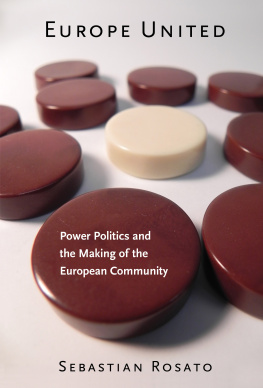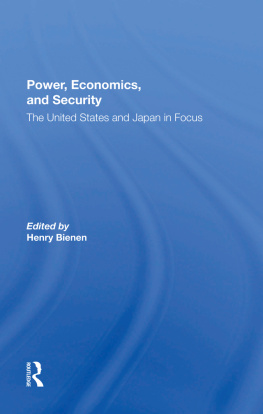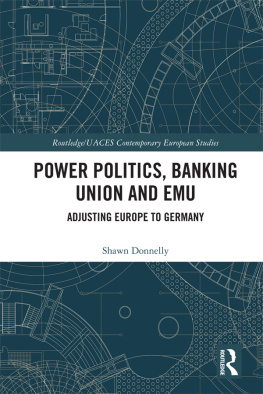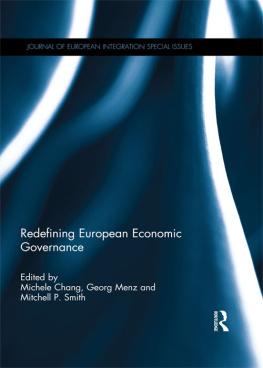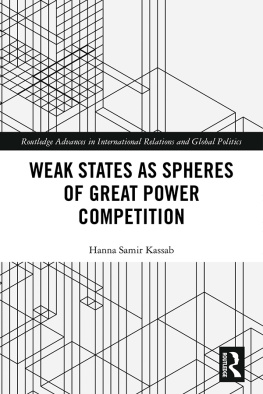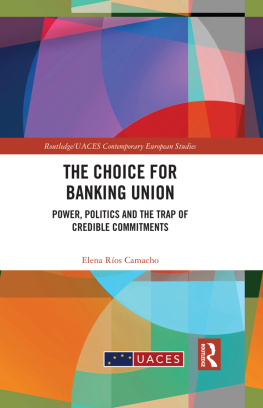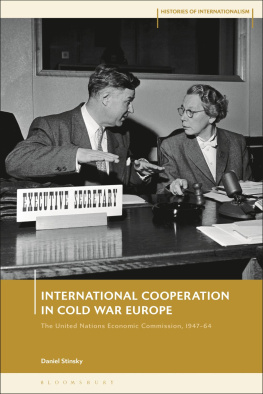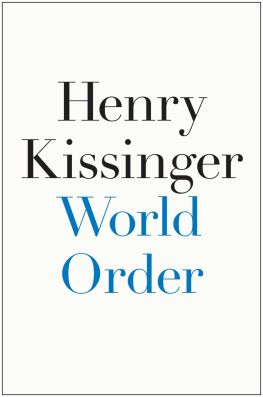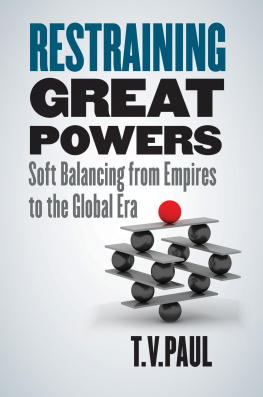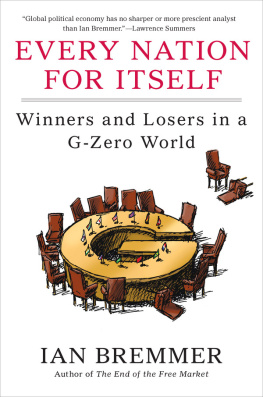1. Introduction
Western Europe, observed Winston Churchill less than two years after World War II, was a rubble-heap, a charnel-house, a breeding-ground of pestilence and hate. Like many of his contemporaries, the former prime minister attributed the continents misery to the nation-state system. A region divided into sovereign states animated by ancient nationalistic feuds could not remain reliably at peace. Indeed, his great fear was that the continent would never recover its past glories because the Europeans would go on harrying and tormenting one another by war and vengeance and squander the first fruits of their toil upon the erection of new barriers, military fortifications and tariff walls.
Churchills diagnosis of the situation prompted him to call for a United Europe based on Franco-German reconciliation. If the people of Europe resolve to come together and work together for mutual advantage, he told his listeners, they still have it in their power to sweep away the horrors and miseries which surround them, and to allow the streams of freedom, happiness and abundance to begin again their healing flow. Western Europe had a supreme opportunity, and if it be cast away, no one can predict that it will ever return or what the resulting catastrophe will be.
With the Benefit of hindsight, most observers would argue that the Europeans have seized Churchills supreme opportunity and built a United Europe. Once distinct and competing nation-states are now members of a supranational community that has no parallel in modern times. That this should have happened in the very region that gave birth to the nation-state system makes the achievement all the more remarkable. How, then, are we to explain this extraordinary political development? More specifically, how can we account for the construction of the European Community (EC)?
The Argument
My central argument is that the making of the European Community is best understood as an attempt by the major west European states, and especially France and Germany, to balance against the Soviet Union and one another.
In the first instance, the Europeans were driven together by their collective fear of Soviet domination. When the guns fell silent on May 8, 1945, the Soviet Union was by far the most powerful state in Europe. None of the former great powers in the western half of the continent could hope to balance its power on their own. Moreover, they worried that the Americans, who had stepped in to defend them from the USSR after the war, might withdraw their forces in the not-too-distant future. This being the case, their only option if they wanted to provide for their own security, especially over the longer term, was the construction of some kind of west European coalition. Vladislav Zubok puts the point well: In a sense, the Cold War polarization was the midwife of the European Community.
The sheer magnitude of the Soviet threat convinced the west Europeans that they must surrender their sovereignty and construct a military-economic coalition governed by a central authority. There was general agreement that a traditional alliance of the major states in the western half of Europe would be no match for the Soviet Union. Although a regular coalition of their national armies might approximate the Red Army in terms of size, it would not be nearly as effective as the single military force at Moscows disposal. Similarly, as long as they retained separate national economies, they would not benefit from the economies of scale and technological advances that were accruing and would continue to accrue to the USSR by virtue of its vast single economic space. In order to compete effectively with the Soviets without U.S. help, the Europeans would have to establish a single military and economy of their own, a task that would, in turn, entail the creation of a central governing authority. This was not a welcome prospect since it required them to surrender their sovereignty over key policy areas. But the Europeans believed they had little choice. If they were to avoid domination by the Soviet Union, then centralization was the only option. As Tony Judt notes, For nations reared within living memory on grandeur and glory, Europe would always be an uncomfortable transition: a compromise, not a choice.
France and West Germany were fairly evenly matched and therefore agreed to share control of the emerging centralized coalition, an arrangement that has come to be known as integration. In power terms, there was little difference between France and the Federal Republic in the 1950s, and consequently both Paris and Bonn understood that they could not seize control of the coalition. They therefore settled for the more modest goal of preserving the roughly even balance of power between them. The best way to do that, they concluded, was to control the group jointly. If control was shared, they would have an equal say in policymaking, and the policies reached through the joint decision-making process would be applied uniformly to both of them.
In short, integration was at root a response to balance of power considerations. The decision to surrender sovereignty and establish a centrally governed coalition was driven by fear of the overwhelming power of the Soviet Union. No group of European states had faced such a mighty adversary since the advent of the nation-state system. Even as they came together in this unprecedented way, however, the French and the West Germans eyed one another warily and worried about the distribution of power within the coalition. It was this concern that led them to conclude that they had to share control of the group: to integrate and establish a community. Integration was the only formula that could conceivably maintain the existing, relatively even, balance of power between them.
Major Events
This kind of reasoning played out twice in the 1950s and in doing so established the core of todays EC. The European Coal and Steel Community (ECSC) was clearly the product of balance of power considerations. The French proposed the heavy-industry pool on May 9, 1950, believing that a centrally governed and jointly managed community of this kind would simultaneously establish a bulwark against Soviet expansion and maintain an even balance of power between France and the newly established Federal Republic. The Germans shared this view. Chancellor Konrad Adenauer, for example, was convinced of the need to construct a substantial counterweight to Soviet power in the western half of the continent and understood that the most Germany could hope for was joint control of the emerging entity. Given such a coincidence of views, it was only a matter of time before the two sides ironed out the details. France, Germany, Italy, and the Benelux states (Belgium, the Netherlands, and Luxembourg) the Six signed the Treaty of Paris establishing the ECSC on April 18, 1951, and the coal and steel pool began operations on July 23, 1952.
In the mid-1950s, the west Europeans went a step further and created the European Economic Community (EEC), again based on balance of power thinking. Although there had been talk of a full-blown economic community for some time, the process that ultimately led to the creation of the EEC began on June 3, 1955, when the Six declared their intention to establish common economic institutions, progressively fuse their national economies, and create a common market. The French and German decisions to commit to the process were based on pure balance of power calculations: a jointly controlled, regionwide economic community would produce enough power to deter Soviet aggression in the event of an American withdrawal from the continent and maintain a rough balance of power within western Europe. It took some time to negotiate the details of the agreement, but the decision had been made. On March 25, 1957, the Six signed the Treaty of Rome establishing the EEC.

